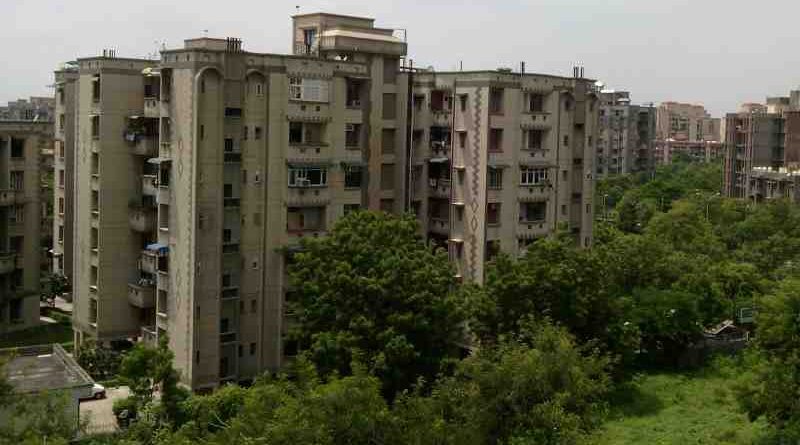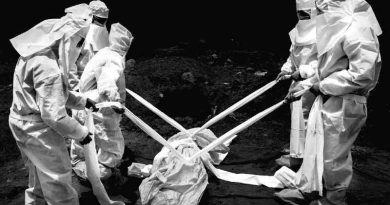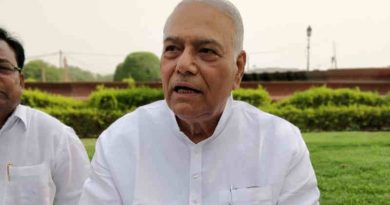Can Government Check Corruption in Delhi Housing Societies?

The residents of Delhi Housing Societies are victims of corruption and human rights violations. Government must save them from the cruel hands of corrupt management committee (MC) members who mostly operate as money-collecting gangs.
By Rakesh Raman

The idea of cooperative societies has its origins in Mahatma Gandhi’s thinking of collective development in the society by forming small groups of contributors in different spheres of human activity.
While Mahatma Gandhi believed that cooperative societies are ideally suited organizations for development in the villages, he floated the `Gram Swaraj’ concept. In the post-independence era, however, India replicated Gandhi’s cooperative model in urban localities also.
As a result, the government empowered cooperative societies so they could become change agents in the socio-economic development of the country. Cooperative housing societies are supposed to be part of the larger cooperative movement in India.
But Mahatma Gandhi must be spinning in his grave looking at the sorry state of affairs in India’s housing societies – particularly in Delhi. They have become dens of corruption under the mis(management) of management committee (MC) members, while the Delhi government has no control on them.
CASE STUDY
Delhi Public School (DPS) Cooperative Group Housing Society, Dwarka, Sector 4, New Delhi
You can safely assume that if the government could control extreme financial and environmental irregularities at DPS Housing Society, it will be easier for the government to discipline other housing societies in Delhi.
Click here to read the full report.
Shady Operations
In order to put an end to the shady operations existing in the group housing and other societies in National Capital Territory (NCT) of Delhi, the government had ordered all societies to make their websites. Although more than a year has elapsed since the order was released, most MCs have brazenly defied the government’s advice.
According to the government notification from the Registrar Cooperative Societies (RCS), the step has been taken to ensure transparency in the working of the societies and to access their data online. The website creation is mandatory / compulsory for each housing society, the government order specified. [ You can read the order here. ]
Further, the societies have been directed to upload all relevant information on their respective websites. This includes membership details, annual audit reports, annual returns, election and details of management committee (MC) members including their mobile numbers, email addresses, etc., AGM & resolutions passed, public notices, and other important information.
CASE STUDY
R. D. Apartments, Plot 20, Sector 6, Dwarka, New Delhi
The residents of R. D. Apartments in Dwarka complain that an illegal FAR construction work has started in their building. The construction work is not only spreading lethal dust and noise pollution, but it has also caused serious accidents. But no government in Delhi is ready to help the beleaguered residents.
Click here to read the full report.
The government has taken the step on the advice from Delhi Cooperative Tribunal, which wants all the societies to have their own websites. The Tribunal observes that if the proceedings or the notices to the members are uploaded on the website, the litigation would decrease.
The litigation has been increasing because the RCS office and other concerned offices have failed miserably to get relief for the residents who are victims of irregularities and dictatorial designs of the MCs in different societies.
The RCS office had directed the MCs of societies to submit their website address to the RCS office within 45 days from the date of the notification. The office also warned the MCs that if they failed to comply, actions as per law may be initiated.
CASE STUDY
Kamakshi Apartments, Plot No. 28, Sector 6, Dwarka, New Delhi
The residents of Kamakshi Apartments say that the DDA officials have blatantly violated the law and granted permission for an illegal FAR construction work in their Society.
Click here to read the full report.
However, it is observed that majority of the housing societies have ignored the government orders and have not created their websites. A handful of societies that have made their websites, do not update the websites with relevant information. It amounts to lawlessness for which MC members (office bearers) are responsible. But unfortunately government has not taken any action against them.
Flawed Financial Accounting
Most societies try to hoodwink their members by distributing printed audit reports and annual returns, which conceal more than what they reveal. These reports and returns are meaningless in the absence of purchase procedures, which most societies do not follow.
The societies are supposed to upload on their websites all financial and purchase information along with related documents – such as need for purchase, expenditure approval process, request for quotations (RFQs), tendering procedures, criteria for selection of vendors, payment terms, project monitoring, quality assurance, and so on.
However, since the societies prefer to work in a totally shady and opaque manner, they do not reveal such information to the individual residents and the government. As a result, they squander public money at will and just distribute crude annual reports and returns, which are not sufficient to present a true financial accounting picture.
This is nothing but corruption on the part of MCs and the government has failed to take any action against the MC members of different societies who are responsible for these financial irregularities that result in fleecing the residents of the societies.
[ Report Corruption in Delhi Housing Societies to Clean House ]
Incidentally, most residents are not even aware that they are being cheated by the MCs because they find it difficult to decipher the complex accounting reports.
As corruption is rampant, the MC office bearers are always eager to make a fast buck and spend individual members’ money unscrupulously without taking proper approvals. They also plan and execute unnecessary (and sometimes illegal) high-value construction projects within the society buildings without following the proper approval and expenditure norms.
If the government – as part of the thorough inquiry – could ask the past and present MC members of all housing societies to declare their assets, it will find that most have assets disproportionate to their known sources of income. Obviously, their assets should be attached by the government and they must be punished. Why not?
Law-Breaking Decisions
The general body meeting (GBM) approval process is totally flawed and the government / RCS office has not bothered to streamline the process despite numerous complaints by the society members.
Moreover, the GBM approvals – if taken in a transparent and truthful manner – should be applicable only to petty issues such as cleaning, gardening or cultural activities in the societies.
But MC members of different housing societies are exploiting the flawed GBM process to even challenge the Indian constitution and law of the land and impose their own will on residents. The MC members in many societies have gone so berserk that they even ignore court orders and continue their corrupt pursuits.
For example, the increasing number of cars is a major irritant in Delhi because of traffic hassles and increasing vehicular pollution. The Delhi High Court has ruled that only one car per flat will be allowed in housing society parking lots.
But Delhi government has failed to check the menace and playing hand in glove with the corrupt managing committees of the housing societies that allow residents to park multiple vehicles inside the society premises under some secret deals with the erring residents.
Worse, these gangs of law-breaking residents supported by MCs gang up to show their majority in the GBMs and get even the illegal decisions approved, as it is happening, for example, in illegal extended construction projects currently happening in multiple housing societies. They even threaten the innocent residents who oppose MCs’ illegitimate acts.
In another example, the National Green Tribunal (NGT) of India observes that one of the major sources of air pollution is dust emission from construction activities. NGT rules that such construction must be stopped to avoid pollution-related diseases and deaths of people including men, women, and children.
NGT has been enacted under India’s constitutional provision of Article 21, which assures the citizens of India the right to a healthy environment.
However, the MCs of housing societies are treating the NGT’s advice with total disdain, as illegal construction is rampant in societies where people are living.
It is believed that the MCs are taking approvals from different government departments for extended construction by bribing the government officials in concerned departments such as the DDA (Delhi Development Authority) and other urban development authorities.
Although the Delhi government has failed to check this construction-based pollution in the occupied societies, it should carry out a thorough investigation in the illegal construction cases and demolish all the constructed structures in housing societies that have tried to circumvent the regulations through corrupt practices.
Government must punish the guilty government officials and MC members who have flouted the government norms so that new construction projects could be stopped.
Extended construction in existing societies also results in human rights violations, as the Government of India has expressed the idea that every citizen has a right to clean air.
Dust pollution will be harmful not only to the societies where construction is happening, but it will engulf the surrounding areas also, making it difficult for people (including children) to breathe.
It is also ludicrous to note that on one side the Delhi government is trying to reduce vehicular pollution in the city, but on the other it is allowing construction-related dust pollution in housing complexes – which is more hazardous for people who are living there.
Impact of Dust Pollution on Climate Change
Recently, the Union Cabinet of India chaired by Prime Minister (PM) Narendra Modi had decided to ratify the Paris Agreement (on Climate Change) and it was ratified on 2nd October 2016, the day of Gandhi Jayanti.
With this ratification, India has pledged to protect the environment to minimize the harmful effects of changing climate on humans and other living beings. However, most in the Indian government departments do not understand the climate change subject.
They fail to understand that there are damaging thermal effects of dust on climate. Research reveals that dust-related atmospheric aerosol pollution has a hazardous effect on climate.
If construction is allowed in the existing housing societies, it will hamper the PM-led drive to ensure clean climate in the country. Thus, it will give a bad name to India in the global arena, which will also jeopardize India’s efforts to create a healthy business environment and invite investments into the country.
Similarly, when construction material – such as bricks, sand, and cement – will continue to occupy housing societies where people – men, women, and children – live, it will cause health hazards to millions of citizens in the affected areas. It will also serve a severe blow to the Swachh Bharat Mission of PM Modi.
It is observed that building extension projects in housing societies are mostly driven by greed, not by need, as owners want to see their property prices increase – without realizing the fact that millions of people in India are homeless.
Instead of allowing housing societies to carry out environment-damaging construction projects, the government must encourage them to embrace contemporary green solutions including solar energy, waste management, paperless working, energy-efficient lighting, and so on.
Remedial Actions
Today, an estimated one-fourth people – in Delhi’s population of about 20 million – reside in group housing societies. These residents need to be saved from the cruel hands of corrupt MC members who mostly operate as money-collecting gangs. Most of the MC members are totally incompetent to manage society affairs in a professional manner.
The residents who support the MCs in their misdeeds are equally ignorant and culprits who should be punished according to the law. Surprisingly, some of these culprits are government employees or employees of the organisations that are regulated by the government.
If the government wants to stop the rising tide of corruption, it must take strict action against such employees who have become part of the racket and support illegal activities in housing societies.
A similar onus is also on private organizations which are supposed to control their mischievous employees who are directly or indirectly involved in any illegal or immoral activity.
There is no denying the fact that avoidable building construction around human beings is a wrongful act. It also promotes corruption. Since construction involves huge money which can be easily swindled, it is the root cause of corruption. So, corruption in the name of construction must be stopped.
The government must also realize that Delhi is already the most polluted city and among the world’s dirtiest cities. If the construction is not stopped in the existing housing societies of Delhi, the city will become a virtual hell for all living beings.
Then the DDA may have to change its slogan from “Proudly We Build The Capital Of India” to “Slowly We Destroy The Capital Of India.” Is the government ready for this perilous transition?
Disclosure: I have written this article not only as a journalist, but also as a victim of the fraud and intimidation happening in a Delhi Housing Society. I am facing repeated threats because I am raising my voice against corruption and human rights violations.
By Rakesh Raman, who is a government award-winning journalist and runs free school for deserving children under his NGO – RMN Foundation.




